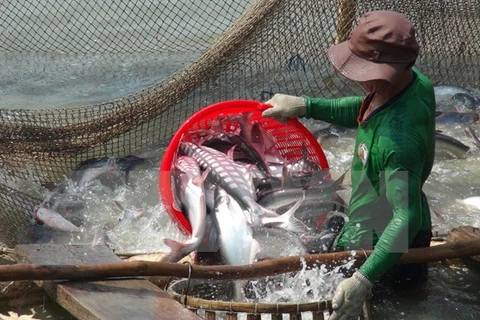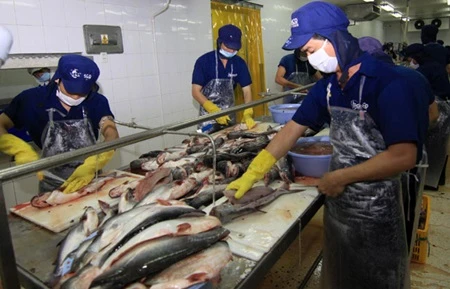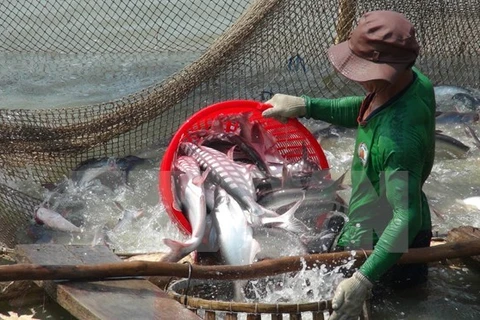Hanoi (VNA) – Relevant Vietnamese agencies have been requested to thoroughly study the US’s regulations imposed on Vietnam’s tra and basa fish in order to employ measures to ensure that exports continue.
The task has been placed on the shoulders of the National Agro-Forestry -Fisheries Quality Assurance Department and the International Cooperation Department under the Ministry of Agriculture and Rural Development (MARD) , the Directorate of Fisheries and the Vietnam Association of Seafood Exporters and Producers (VASEP), in the wake of the US Department of Agriculture (USDA)’s recent ruling establishing an inspection programme for fish under the Siluriformes order, including Vietnam’s tra and basa fish.
MARD Minister Cao Duc Phat said the US’s swift implementation of its inspection programme, scheduled for March 2016, will cause a range of difficulties for Vietnamese exporters and managers.
Between now and March 2, the ministry will coordinate with the VASEP to send the US a list of Vietnamese businesses who are keen to continue shipping tra and basa fish to the market.
At the same time, Vietnam will inform the US about its legal system and State management over food safety in tra and basa fish production and processing, as required by the US side, the official said.
According to the Minister, Vietnam will have a transitional period of 18 months, starting from March 2016, during which the country has to prove that its tra and basa fish production management system is similar enough to the US’s.
However, he said, this remains Vietnam’s biggest concern, as its management system is quite different from that of the US.
During this time period, the Southeast Asian nation must overhaul its production and quality inspection processes as demanded by the US, Minister Phat said, adding that relevant Vietnamese agencies have been urged to trace unsuitable and dissimilar regulations and adjust them.
Vietnam should follow the US’s regulations and standards that are in accordance with international practices and based on scientific evidence, he suggested.
MARD has also conducted direct discussions with the USDA to ease adverse impacts on Vietnam’s production and export of aquatic products to the market, the official noted.
The final rule, released by the USDA's Food Safety and Inspection Service (FSIS) on November 25, will be applied on both locally raised and imported Siluriformes fish.
It was developed in order to implement provisions required by the 2014 Farm Bill. The rule will become effective in March 2016, 90 days after it publishes in the Federal Register .
The agency will conduct extensive outreach to domestic industry and international partners so that they fully understand FSIS' requirements, prior to its full implementation, USDA Deputy Under-Secretary for Food Safety Al Almanza said in the release.
The rule’s effective date of March 2016 begins an 18-month transitional implementation period for both domestic and international producers. On the effective date, all Siluriformes fish, including catfish, will be under the regulatory jurisdiction of FSIS and no longer regulated by the US Food and Drug Administration (FDA).
Before that date, countries currently exporting products to the US who wish to continue doing so must provide a list of establishments that currently export, as well as written documentation of their regulatory authority and compliance with existing FDA import requirements.
During the 18-month transitional period, FSIS will re-inspect and conduct species and residue sampling on imported Siluriformes fish shipments at least quarterly at US import establishments.
According to the Viet Nam Association of Seafood Exporters and Producers (VASEP), Viet Nam will earn an estimated turnover of 950 million USD from tra exports in the second half of this year. With this, the country is expected to make 1.7 billion USD this year, four percent lower than last year.
VASEP said tra exports to the US fell recently when businesses had to pay a high anti-dumping tax of nearly 1 USD per kg, causing difficulties for Vietnamese exporters and American importers.-VNA
























